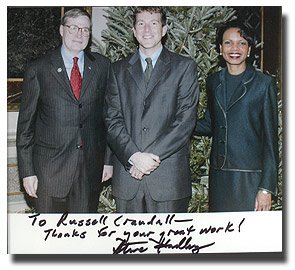Russell Crandall was appointed Director for Western Hemisphere Initiatives, one of five advisors for the Western Hemisphere to the President and National Security Advisor. In that pressure-cooker environment inside the White House where work days could stretch to sixteen hours, he fielded a ceaseless barrage of highly classified e-mail messages, analyzed America’s diplomatic actions and policies in the hemisphere, drafted memos for the president and National Security Advisor that helped determine the country’s foreign policy, and deliberated policy in the Situation Room with top foreign policy officials.

An impressive souvenir — Crandall with (l-r) two National Security Advisors — current title holder Stephen Hadley and his predecessor, Secretary of State Condoleeza Rice.
This is what Russell Crandall found when working on Central and South American Relations with the National Security Council:
He continued, “I’m much more skeptical now of what I read in the press because reporters often don’t have the full story, or are predisposed to cover an event from a certain angle. And over the course of my time in government, I often asked myself if I perhaps I had done too much pontificating from my own ivory tower in education.”
Based in part on his time in the White House, Crandall has written an article for the winter edition of the widely read journal, The National Interest, that he hopes will help set the record straight on current relations between America and Latin American nations. Entitled “The Myth of the Latin American Backlash,” the article contends that media focus on vocal protests in South America against U.S. policies ignores the fact that relations between North and South are the strongest in almost fifty years. “Contrary to the general impression, there’s been significant progress on making democracy the only game in town in the Western hemisphere,” he said. “Almost all governments in Latin America are cooperating with us now on key issues such as making military forces more respectful of human rights, and both sides are eager for progress in trade relations.”
He writes in the article, “The region at times is stymied by a vicious cycle of voter apathy, poor public institutions, anemic economic activity and continued social unease. But the most encouraging sign is that Latin Americans seem predisposed to solve social and economic problems via the ballot box. Popular dissatisfaction with the pace or outcome of reforms has not lead to revolutions or coups d’état.”
Russell Crandall, a Davidson College political scientist, has published numerous op-ed pieces about Latin American affairs in the Wall Street Journal and been a regular contributor to domestic and international media about events in the region. But Crandall hasn’t been very interested in talking with the press during the last three months, since the day he walked away from the White House after nine months spent as a staff member at the National Security Council (NSC).
Crandall was appointed Director for Western Hemisphere Initiatives, one of five advisors for the Western Hemisphere to the President and National Security Advisor. In that pressure-cooker environment inside the White House where work days could stretch to sixteen hours, he fielded a ceaseless barrage of highly classified e-mail messages, analyzed America’s diplomatic actions and policies in the hemisphere, drafted memos for the president and National Security Advisor that helped determine the country’s foreign policy, and deliberated policy in the Situation Room with top foreign policy officials.
“It really changed my outlook,” admitted Crandall. “Given that I was on the NSC, my access was to sensitive information was unprecedented even for government. Being privy to classified intelligence made me realize how much people outside of that environment don’t know, even if they think that they do know. I’m reminded of the time when Secretary of Defense Donald Rumsfeld said, ‘People that talk don’t know, and people that know don’t talk.’ “
Crandall concludes that a continued low-key U.S. approach to the region is best because, “A number of Latin American governments—especially the leftist ones—are hesitant to be seen as too close to Washington; yet, behind the scenes they are developing increasingly deep and trustful relationships with the United States.”

Bolivian coca growers leader Lonilda Zurita (L) speaks during a meeting at the coca growers’ headquarters, as Vice President-elect Alvaro Garcia Linera listens, in Cochabamba, about 400 km (248 miles) southeast of La Paz, December 21, 2005. President-elect Evo Morales’ pledge to protect coca crops to help Indians, who celebrate the leaves as a centerpiece of their ancient culture, could antagonize Bolivia’s neighbors and the United States who fear only cocaine traffickers will benefit. (REUTERS/Danilo Balderrama)
And here is another thorough look at South American policies. This posting focuses on the new Bolivian President Morales concluding that the recent Morales win may not be such a threat to US interests after all:
Morales And The Latin American Populist Cycle
